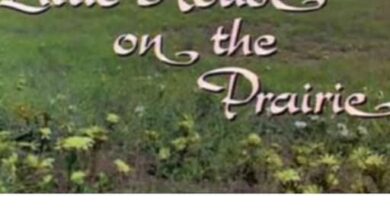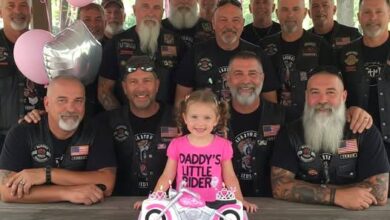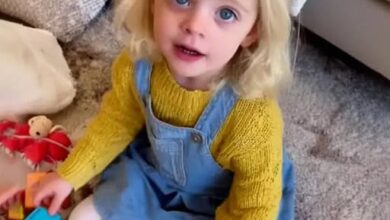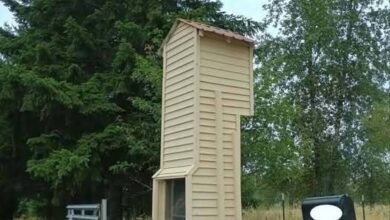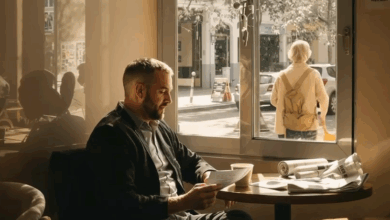
I Mowed My Elderly Neighbors Lawn, Days Later, I Was Unexpectedly Handed a Private Jet Ticket!
I never thought cutting grass would change my life. But a small act of kindness for my elderly neighbor set off a chain of events that exposed a hidden family feud, uncovered an heirloom worth a fortune, and gave my son and me a future I never dared to dream of.
My name’s Aaron. I’m 29, a single dad from a quiet town in Indiana. My son, Jack, is seven — curious, stubborn, and far too smart for his own good. His mom, Hannah, left when he was still in diapers. No fight, no warning — just a text that said, “This life isn’t for me. You’ll do better without me.”
She disappeared after that. No calls, no visits, not even a postcard. I spent months angry at her, then angry at myself for being angry. But anger didn’t feed a child. So, I kept moving — taking handyman jobs, patching driveways, fixing fences, mending whatever people needed mended. It wasn’t much, but it was honest work, and it kept food on the table.
That’s when I met Mrs. Whitmore.
She lived two houses down — a sweet older lady in her late seventies with snow-white hair, a floral apron, and a garden that always looked like something from a storybook. I’d see her now and then, watering her roses or humming to herself on the porch. She reminded me of the kind of grandmother Jack never had.
One afternoon in July, I was fixing a gutter on a neighbor’s house when I noticed her struggling with an old push mower. She was trying to force it across the lawn, and I could tell by the way her shoulders slumped that it was getting the better of her. Then it happened — the mower jolted forward, and she fell hard on the grass.
I dropped my wrench and sprinted over. She tried to wave me off. “I’m fine, dear,” she said, wincing. But I could see the pain in her eyes. I helped her to the truck and drove straight to the ER. Turned out she’d bruised her hip but hadn’t broken anything.
When I brought her home, she tried to thank me, but I just smiled and told her to rest. While she napped, I mowed the rest of her yard.
From then on, checking on her became part of my day. After work, I’d bring groceries or fix something around her house. Jack came along too, always eager to help or ask for one of her famous oatmeal cookies. She started calling him “Mr. Jack” and said he had “an old soul for such a young man.”
One evening, while tightening her leaky faucet, I asked if she had any family nearby. She hesitated before answering. “I’ve got a son — Paul. He lives in Chicago. Big finance job, big house. We haven’t spoken in years.”
“Does he visit?” I asked gently.
“Once, after his father died,” she said, folding a towel. “He said he was too busy to come again. Calls on my birthday sometimes, when he remembers.”
It broke my heart. I thought about my own mom, who died when I was seventeen. If she were still around, I’d visit her every Sunday without fail.
That night, before I left, she handed me a small wooden chest. It was old — dark, carved with strange patterns, and heavy enough to make me hesitate.
“I want you to have this,” she said.
I shook my head. “Mrs. Whitmore, I can’t take something like that.”
Her wrinkled hand closed over mine. “You’ve done more for me in two months than my son has in twenty years. You and that little boy brought laughter back into this house. Please — take it.”
I brought it home but tucked it in my closet. I figured one day I’d return it to Paul if I ever met him.
Two weeks later, she passed away in her sleep. Peaceful, they said. I didn’t cry until I saw Jack standing by her grave with a small bouquet of wildflowers in his hand. “She’s really gone?” he asked. “But I didn’t say goodbye.”
That night, thunder rolled in, and rain hammered the roof. Jack crawled into my bed, clutching his stuffed raccoon, while I lay awake thinking about that chest. Something about it nagged at me — the way she’d looked at me when she gave it, like she knew it meant more than I realized.
Two mornings later, there was a knock on my door.
A man in a tailored suit stood there, sharp as a blade. “You’re Aaron Mitchell?” he asked.
“Yes.”
“I’m Paul Whitmore. This is my attorney.”
He didn’t wait for an invitation. “You have something that belongs to my family — an heirloom chest. It’s worth a great deal. I’m here to collect it.”
I crossed my arms. “Your mother gave it to me.”
He laughed — cold, dismissive. “You think mowing her lawn earns you an inheritance? She was old. Confused. I’ll pay you for your trouble.” He scribbled a number on a check and slid it toward me.
I looked him dead in the eye. “Not interested.”
His lawyer spoke up before things could boil over. “Mr. Mitchell, perhaps you should come to my office. There are documents you’ll want to see.”
I went, mostly to end the nonsense. What he handed me there nearly made Paul choke on his own rage.
It was a notarized letter from Mrs. Whitmore herself:
“I, Eleanor Whitmore, being of sound mind, do hereby gift my wooden chest to Aaron Mitchell, in thanks for his kindness and care. This is a present given freely in my lifetime and witnessed.”
Paul’s face turned crimson. “She was manipulated! This is fraud!”
The lawyer didn’t flinch. “Your mother’s decision is legally binding, Mr. Whitmore. The chest belongs to Aaron.”
Paul stormed out, slamming the door so hard the blinds rattled.
That night, I finally opened the chest. Inside were old coins, sketches, a faded locket, and an envelope labeled “To the one who stayed.”
Her note read: “If you’re reading this, Paul came looking for what he lost long ago — not the chest, but heart. You have that. Take care of your boy. The world needs men like you.”
A week later, I took it to an antique appraiser. The man nearly dropped his glasses. “This is eighteenth-century Italian. The craftsmanship is museum-grade. It’s worth at least three hundred thousand, possibly more.”
I walked out in shock, clutching the valuation slip like a lottery ticket. Three hundred thousand dollars — life-changing money.
Then I remembered another envelope the lawyer had given me that day. I hadn’t opened it yet. Inside was a private jet ticket and a letter:
“Aaron, I want you and Jack to see the ocean. My late husband’s summer home on the coast is now in your name for one month. Everything is paid for. Consider it a gift for being the kind of man I hoped my son would become.”
I sat at my kitchen table and cried. Real, chest-deep tears — the kind that burn and heal at the same time.
Two weeks later, Jack and I were on that plane. He pressed his face to the window the entire time, eyes wide with wonder. “Daddy, we’re really flying!”
We spent two glorious weeks at that beach house — sandcastles, seashells, ice cream for dinner, laughter echoing through every room. For the first time in years, I felt free.
When we returned, I got calls from collectors offering ridiculous sums for the chest. One man offered nearly half a million. I almost said yes. Then I remembered her words: “You have heart.”
I looked at Jack coloring spaceships on the floor and realized — I didn’t need to sell it. We were already rich in the only way that mattered.
So I turned down every offer.
Mrs. Whitmore hadn’t given me the chest for its value. She’d given it to me because I showed up when no one else did. Because kindness still matters, even when no one’s watching.
That’s her real legacy.
And I’ll make damn sure my son grows up knowing that the truest treasures in life aren’t the ones you keep locked in a box — they’re the people you choose to love, and the good you choose to do.
